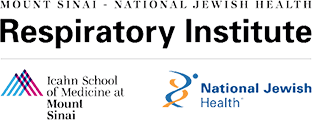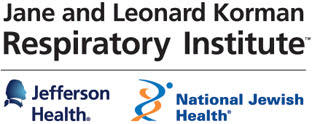Partnerships
Our partnerships ensure we can deliver our unique model of care around the nation. The NJH Cohen Family Asthma Institute partners with Mount Sinai in New York, Jefferson Health in Philadelphia, and Saint Joseph Hospital in Denver, to provide outstanding focused clinical care, collaborative research programs, and inspired educational initiatives all aimed at developing a cure or asthma.
Mount Sinai – National Jewish Health Respiratory Institute
 In January 2015, the Mount Sinai – National Jewish Health Respiratory Institute opened on the Mount Sinai Hospital campus in New York City. The Respiratory Institute, a collaboration between the Icahn School of Medicine at Mount Sinai and National Jewish Health, creates a strong, integrated program for diagnosis and treatment of respiratory diseases, including asthma, chronic obstructive pulmonary disease, lung cancer and interstitial lung disease. Research programs combining the best of both institutions including long-standing collaborations in pediatric and adult programs are being enhanced.
In January 2015, the Mount Sinai – National Jewish Health Respiratory Institute opened on the Mount Sinai Hospital campus in New York City. The Respiratory Institute, a collaboration between the Icahn School of Medicine at Mount Sinai and National Jewish Health, creates a strong, integrated program for diagnosis and treatment of respiratory diseases, including asthma, chronic obstructive pulmonary disease, lung cancer and interstitial lung disease. Research programs combining the best of both institutions including long-standing collaborations in pediatric and adult programs are being enhanced.
The Respiratory Institute uses the multidisciplinary approach practiced by National Jewish Health in its programs. Pulmonologists collaborate with specialists in related disciplines, including cardiology, allergy, gastroenterology, rheumatology, otolaryngology and thoracic surgery, to provide team-based, patient-centered care.
The Respiratory Institute also incorporates Mount Sinai’s programs in personalized medicine, genomics and data-driven clinical protocols to enhance the quality and outcomes of the respiratory disease practice.
In April 2018, the Mount Sinai – National Jewish Health Respiratory Institute opened a second location in New York City. Doctors are seeing patients who are experiencing a wide range of lung conditions, including asthma, in Union Square.
Jane and Leonard Korman Jefferson Health – National Jewish Health Respiratory Institute in Philadelphia
 In April 2017, National Jewish Health announced a partnership with Jefferson Health to create the Jane and Leonard Korman Jefferson Health – National Jewish Health Respiratory Institute in Philadelphia. The Respiratory Institute is based in downtown Philadelphia, with additional future locations anticipated across Jefferson Health’s regional campuses on the East Coast.
In April 2017, National Jewish Health announced a partnership with Jefferson Health to create the Jane and Leonard Korman Jefferson Health – National Jewish Health Respiratory Institute in Philadelphia. The Respiratory Institute is based in downtown Philadelphia, with additional future locations anticipated across Jefferson Health’s regional campuses on the East Coast.
National Jewish Health & Saint Joseph Hospital
 National Jewish Health and Saint Joseph Hospital have formed a joint operating agreement to provide inpatient and outpatient care together in Colorado. This collaborative care model brings together two leading health care organizations with complementary cultures, missions and dedication to excellence to focus together on providing the best care possible. The strong outpatient approach and specialty expertise of National Jewish Health complements the focused inpatient expertise of Saint Joseph Hospital, increasing our ability to manage patients along the full continuum of care.
National Jewish Health and Saint Joseph Hospital have formed a joint operating agreement to provide inpatient and outpatient care together in Colorado. This collaborative care model brings together two leading health care organizations with complementary cultures, missions and dedication to excellence to focus together on providing the best care possible. The strong outpatient approach and specialty expertise of National Jewish Health complements the focused inpatient expertise of Saint Joseph Hospital, increasing our ability to manage patients along the full continuum of care.
The Cohen Family Asthma Institute, and all the divisions and departments of National Jewish Health, rely on the collaborative model of research and care that is integral to the success of the institution.
Collaborations
At National Jewish Health our physicians and researchers are at the forefront of a new era in health care that focuses on a personalized, preventive approach to asthma. We understand each person is unique and variations in DNA, environment, diet, and personal habits all influence their individual health. We collaborate organizations across National Jewish Health to ensure all factors are considered in our diagnosis and treatment of severe asthma and all health conditions.
National Jewish Health Center for Genes, Environment and Health (CGEH) researchers are looking at environment-gene interaction and making strides in predicting, preventing, treating and tracking many diseases, including asthma. Using an individual’s DNA, we are able to:
- Predict and prevent disease
- Guide the right choice of therapy
- Limit side effects and bring higher success rates for treatments
- Track the effects of these therapies
National Jewish Health Asthma investigators are actively collaborating with asthma researchers at University of Colorado Health and Children’s Colorado in a number of research studies. One exciting new collaborative study is the National Institute of Health Precise Study which is studying precision interventions in severe and/or exacerbated asthma.
National Jewish Health has invested in the following additional internal collaborations to further advances in personalized medicine:
The Institute for Advanced Biomedical Imaging offers cutting-edge technology in and the world’s top chest radiologists to provide the advanced diagnostics central to personalized medicine. Airway diseases related to asthma or mimicking asthma are often detected by our radiologists. Our faculty are known around the world for their expertise in thoracic imaging and can identify diseases other experts have missed.
The Advanced Diagnostic Laboratories are essential in providing laboratory diagnostic tests for the delivery of personalized medicine. These facilities, often working with other diagnostic arms of National Jewish Health, develop tests that provide patients with individualized information on disease risk, drug responsiveness, and health prognosis.
The Minimally Invasive Diagnostic Center provides a variety of diagnostic, therapeutic and palliative pulmonary procedures, as well as gastroenterology and otolaryngology services. Recent advances in technology have made it possible for doctors to perform a variety of diagnostic and therapeutic procedures in an outpatient setting – procedures that previously required invasive surgery and a stay in the hospital.
The Integrated Bioinformation and Specimen Center is a centralized repository of tissue samples from throughout the institution. The samples are anonymous to protect patient privacy. However, the tissue samples are linked to information about the patient who donated them, including diagnosis, CT scans, X-rays, genetics and more. They offer a tremendous resource for researchers seeking biomarkers that can help predict whether a person will get a disease, the likely course of that disease and which medications will work for patients with that specific biomarker.